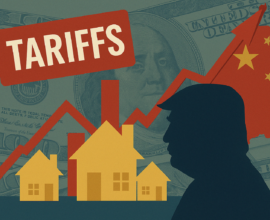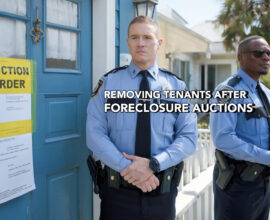County Foreclosure Auction: 10 Great Tips
Buying at a county foreclosure auction can prove to be quite profitable for real estate investors, but there are a number of potential pitfalls that can prove problematic, resulting in a scenario where you acquire a property that lacks profitability. So to protect your profit margin, consider the following tips for buying property at a foreclosure auction.
Tip #1: Evaluate the Location
In the world of real estate, location matters! And it’s not just city or county that matters; the neighborhood or even the property’s location within a neighborhood can have a major impact on market value. For instance, a water view can boost property value by 20% or more, while the same home located in a more depressed neighborhood may sell for a fraction of what you could reasonably expect to get in a nicer area. So take some time to research the location and the average sale price in that neighborhood.
Tip #2: Visit the Property in Person
Whenever possible, it’s prudent to visit the county foreclosure property in person, as this will provide you with some valuable insight into the home’s condition. In a foreclosure auction, the seller does not need to disclose information about the county foreclosure property, so the burden falls on the bidder to determine what issues and flaws may exist.
Tip #3: Determine if the Property Has Suffered Damage Due to Vandals or Squatters
Many foreclosure properties stand vacant for months or even years. It’s not entirely uncommon for these properties to attract squatters, vandals, thieves or even teens seeking a place to party. So if you feel comfortable approaching and walking around the property, look for signs of unauthorized occupation such as trash in the yard or broken doors and windows.
You should also be on the lookout for damage that may have led to collateral damage over time. For instance, if a window is broken, animals may gain access into the home’s interior, causing damage. If the roof is damaged, you could see major interior damage from water and mold impacting the drywall, wiring, insulation, and other structures.
Tip #4: If You Spot Damage, Attempt to Evaluate the Extent (And the Approximate Repair Costs)
If you do identify areas of concern, it may be wise to consult your go-to contractor or rehabber partner. A professional with experience rehabbing properties will be in a good position to determine the likely extent of damage and the probable impact on property value and salability. This is key because you must account for repair costs when placing your bid. The last thing you want is to acquire a county foreclosure property that will become an expense rather than a profitable investment.
Tip #5: Attempt to Determine if the Property’s Appliances and Fixtures Are Present and Intact
If you visit the county foreclosure property in person and you deem it safe to approach the home, it can be beneficial to determine if commonly-stolen items are present and intact. Foreclosure properties my remain vacant for a long period of time, which leaves them vulnerable to theft. It’s also not uncommon for disgruntled homeowners to sell off anything and everything of value when foreclosure is imminent. Some commonly-stolen (or sold) items include:
- Cabinetry;
- Fixtures (lights, plumbing, etc);
- Kitchen Appliances;
- Well Equipment;
- Pool Equipment;
- HVAC Equipment;
- Copper Piping
Notably, when these items are stolen, it’s common to see lots of collateral damage since the items are removed without care for the rest of the property. So this is something you’ll want to consider and account for as you crunch the numbers.
Tip #6: Check for Liens
Checking a county foreclosure property for liens is absolutely critical! This is one of the most problematic yet common mistakes committed by inexperienced real estate investors.
It’s not uncommon for a county foreclosure property to have multiple liens in place. For instance, a home may have liens associated with a primary mortgage, a second mortgage, in addition to a tax lien. Typically, just one lien holder initiates the foreclosure, but your purchase of the property does not necessarily wipe out the other liens. These sums must still be paid. In some cases, you may be able to secure the property for a price that allows for profit, even after the liens are paid in full and repairs are completed. But in other cases, you may find that the property represents a bad investment when other liens are taken into account.
Tip #7: Place Your Deposit With the Clerk’s Office in Time
In order to place a bid in a county foreclosure auction, you’ll need to pay your deposit to the clerk’s office by the set deadline—usually 24 to 36 hours prior to the start of the auction. To avoid any problems, call in advance to verify the deadline for submitting your deposit and verify that your intended payment method is acceptable. A bank check or another verified payment method is typically required; not all accept cash.
You’ll also want to verify the deposit amount, which is typically set at 5% of your intended maximum bid. Avoid surprises and call ahead to verify these key points so you don’t miss out on an investment opportunity due to a missed deadline.
Tip #8: Secure Funding In-Hand by Auction Day
Foreclosure auctions require you to have your funding in-hand at the time you place your bid, as payment is typically expected in full within 24 hours of the auction’s conclusion. If you encounter a delay in securing funds, you risk losing the property and your deposit.
Tip #9: Run the Numbers Properly
Always double and triple check your math when buying at a foreclosure auction. Err on the side of caution by over-estimating expenses and under-estimating profits. And remember, when determining approximate market value, be sure to look up recent sales of comparable properties in the neighborhood. You cannot rely upon asking price, as a seller can place any figure—no matter how ridiculous—on the property’s price tag. Asking price has little impact on (or relation to) what people are actually willing to pay in the current market conditions.
You’ll also want to verify that your comparables are, in fact, comparable. If a property is in another, more desirable area of a neighborhood, it may fetch a much higher sale price than the property you hope to acquire.
Tip #10: Stay Calm and Determine Your Maximum Bid in Advance
Auctions tend to excite the emotions, which can result in a less-than-profitable real estate investment. Make a concerted effort to stave off excitement and set a firm maximum bid figure when you are calm and level-headed. This will maximize your chances of making a good business decision when buying at a foreclosure auction.
Also, consider these tips and tricks for bidding:
Never submit your maximum bid as a pre-bid or at the start of the auction.
Let the auction run for a while before placing a bid. This gives you an opportunity to study the other bidders, determining whether they’re aggressive or passive.
Bid in $5,000 increments, but keep in mind that the entire sum may not immediately be reflected in the current leading bid. The system will only apply what’s needed to outbid the current highest bidder.
If bids are increasing in small increments of $100 to $500 and the clock is running down, then this is a clear indication that your competition is running out of steam. So once you have just 30 seconds left on the clock, enter your full and final bid amount. This will either “kill off” your competition or it will prompt them to place a bid that is higher than what you’re willing to spend. Obviously, the latter scenario is not ideal, but that’s the nature of an auction.
Follow the auctions for a week or two before you actually participate. It’s typical for a new bidder to encounter lots of questions, but simply observing will give you a chance to familiarize yourself with the process. It’s better to seek out answers before you have a large sum of money on the line.
Some auction sites have a “sandbox” or practice area where you can participate in a simulated auction. Use this area to your advantage so you can become familiar with the bidding process and platform.
Remember that foreclosure auctions are a regular, daily event. So it’s not the end of the world if you don’t secure the winning bid. Be patient and keep monitoring for different opportunities. It’s possible you may need to wait several weeks or even a couple months to find the right county foreclosure property. But that’s preferable over rushing in and overpaying.
Be on the lookout for communications from the County Clerk’s office following an auction. On occasion, if the high bidder does not pay in time, the county foreclosure property may be offered to the second highest bidder.
Real estate investment can be challenging, particularly for those who lack experience. And it’s a niche that’s made even more complex by the fact that you have large sums of money at stake. Even those who come to the foreclosure auction to find an affordably-priced fixer-upper property for use as their next home face many of the same challenges. But following these ten tips will set you on a path toward success. PropertyOnion.com has some great tools and resources to help you prepare for your next foreclosure auction.









How do I arrange to view interior of property before bidding?
Unless the property is currently on the market for sale, there is no way to view the inside of it, as these properties are all sold “sight unseen”, thus the discount sale prices at the end of the auction. You would need to use the techniques in this article as well as the tips for viewing interiors outlined in our premium member’s only E-Books.
What are some of the pitfalls and advice that you can give on a property that has a Home Equity Conversion Mortgage (HECM)/Reverse Mortgage when buying at auction?
Warren, sorry for the late reply; for some reason, this just came up on my system.
A reverse mortgage performs in the same way as any other mortgage in a foreclosure situation.
If the reverse mortgage company/lender is the one foreclosing, then, in that case, their encumbrance falls away at the auction but beware of other liens of judgments that remain that could prejudice getting the property free and clear.
If any other entity is bringing the foreclosure, their lien (reverse mortgage) remains and will have to be settled post-foreclosure auction.
You should try and get a payoff amount before bidding; however, I understand this is not as easy as it seems, as usually the lender will only talk to the borrower or their representative in most cases.
If you try to calculate the payoff amount yourself using an amortization calculator, reverse mortgages are slightly different in structure from typical mortgages.
In the truest sense, the reverse mortgage lender should take procession of a property following the death of the borrower/s.
I am not a big fan of buying a property with a reverse mortgage, and when I have done in the past, I always have used the services of an attorney.